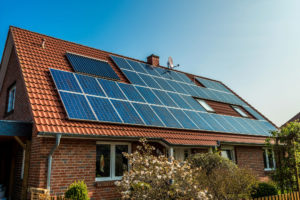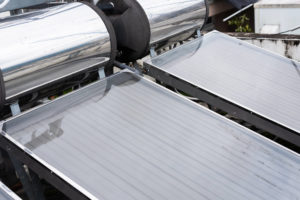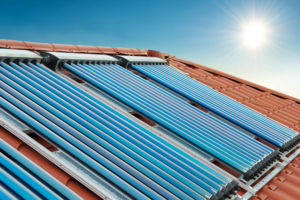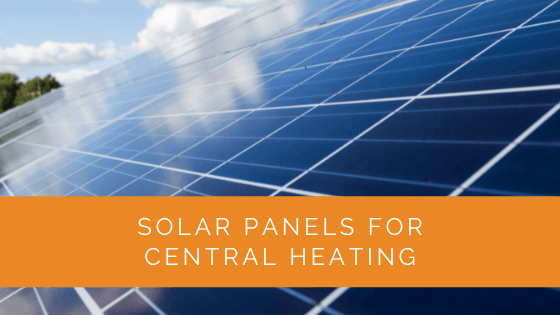The world is changing, and so are our energy needs. As we move towards a more sustainable future, solar energy is emerging as a pivotal component in this environmental transformation. Solar panels, designed to harness the sun’s abundant energy, hold the promise of becoming a primary source of renewable power, addressing pressing climate concerns and offering substantial cost savings.
In this article, we will be exploring the world of solar panels for central heating and how they can help you achieve your sustainability goals. We will be looking at the various types of solar panels available, their importance, and the numerous benefits they offer. From reducing your environmental footprint to providing a reliable energy source, solar panels have the potential to transform the way we consume energy. With solar-powered heating systems, you can now enjoy a comfortable and warm home while making a significant impact on the environment. So, let’s dive in and explore how these panels can help you save money, reduce carbon emissions, and contribute to a cleaner, greener future.
Contents
- 1 Key Takeaways
- 2 Solar Energy in the UK
- 3 What Are Solar Panels?
- 4 What Is the Need for Solar Panels?
- 5 Benefits of A Solar Panel System
- 6 Types of Solar Panels for Heating
- 7 Understanding Solar PV & Thermal
- 8 Investing in a Solar Water Heating System
- 9 Is Planning Permission Mandatory for Your Solar Panel?
- 10 Case Study: Efficient Central Heating with Solar Panels
- 11 Expert Insights From Our Solar Panel Installers About Solar Panels for Central Heating
- 12 Discover the Power of Solar with Solar Panels Network
- 13 Final Thoughts
Key Takeaways
- Solar panels are a crucial part of the UK’s renewable energy landscape, with solar capacity expected to double by 2030 and the government focusing on ground-mounted solar national parks.
- Solar panels offer numerous benefits, including reducing energy bills, generating heat, and fulfilling hot water requirements, making them a smart choice for shifting to renewable energy.
- Different types of solar panels, including solar thermal and solar PV, cater to various energy needs, with hybrid options like photovoltaic thermal collectors and heat pumps offering enhanced efficiency.
Solar Energy in the UK
The solar energy system is one of the main components driving the UK’s goal towards net zero. Solar capacity is projected to grow substantially in the coming years, paralleling current trends in the business sector. The government is focusing on a ground-mounted solar national park.
The sun’s energy is better harnessed via solar panels. So, they are one of the primary forms of renewable energy in the UK and are in peak demand.
You are well aware of the climatic crisis the world is caught up in. Bearing this in mind, shifting to renewable energy is the bright choice for the future.
Considering this, installing a solar system at your home would be a better choice for shifting to renewable energy. These panels are also energy-efficient and help you save money!
What Are Solar Panels?
A solar panel helps convert the sun’s radiation into electricity. It functions based on the photovoltaic effect. That is, when direct sunlight touches the panel, the sun’s energy gets absorbed by the solar collectors or cells.
These cells then vibrate and help in generating electricity. This brings us to the most debated question – Why do you need a solar heating system?

What Is the Need for Solar Panels?
The environmental concerns around us are why we should start using solar power. Other than that, our traditional power source is derived from limited sources. So, it is wise to shift to solar systems.
A solar panel system is your one-time investment and is a free power source. This way, you save money and reduce energy costs.
Are you wondering whether to choose solar tube collectors or solar panels? Well, solar panels are a clear winner with a better efficiency rate.
Benefits of A Solar Panel System
- Good for the environment
- Free Source of Energy
- Reduces energy bills
- Generates heat
- Fewer electricity blackouts
- Fulfils your hot water requirements.
Types of Solar Panels for Heating
The solar energy sector has been rapidly developing over the years. It has been adapting and producing newer varieties based on the increasing demand and choices. This has led to the creation of multiple types of panels.
The system terms and complicated types could be overwhelming. So here is a brief explanation of different types of panels.
Understanding Solar PV & Thermal
The first step in getting to know the varieties of solar panels is learning to differentiate solar PV and solar thermal. The absorbed energy from the sun is used in different ways.
If you want to generate electricity, opt for solar PV panels. And go for a thermal panel if you produce heat, and use a solar hot water cylinder. Here’s why.
Solar Thermal
The solar thermal system is used to generate heat and get warm water. If you are looking for solar water heating systems, then choosing a solar thermal system is better. It heat pumps the round liquid due to the sun and helps get a hot water tank.
Simply, it absorbs the sun’s energy to heat your household water. The installation of the thermal panel and PV panel is the same. You place it on the roof and help it get maximum heat from the sun.
The solar heating system works so that the heat generated from the panel gives warm water. It is then stored in a hot water cylinder. Whenever there is a need, the heat water stored is used.

Solar PV
Solar photovoltaics is commonly known as solar PV panels. It is used to generate electricity. Using direct sunlight, solar PV panels produce electricity and pass it to the functioning of electrical appliances at home.
Since solar PV panels produce electricity, there is always confusion about using them for hot water.
Technically, solar PV does not just reduce the costs of electricity but also helps you get free water. The electricity generated using solar PV can be used to heat your hot water cylinder.
Immersion Heater for Heating
If you have an existing cylinder with an immersion heater, you could easily use solar-generated electricity to boil water. Diverting the electricity to your immersion heater can be done using a solar power diverter.
An immersion heater is a heating element in your hot water cylinder that uses electricity to heat hot water. So, what’s a solar power diverter? On many occasions, your solar PV panel might produce excess electricity.
In such situations, a solar power diverter will divert the excess energy to the immersion heater in your hot water cylinder. Say you turn on your kettle to heat water; when the immersion heater gets the electricity, the diverter will redirect that electricity to your heating system.
Photovoltaic Thermal Collectors
The right mix of the best in both solar PV and solar thermal panels is solar photovoltaic thermals. These are also called Photovoltaic Thermal Collectors or hybrid solar collectors. This hybrid panel uses energy from the sun to produce electricity and heat.
Hybrid Solar Collectors produce a better overall efficiency than solar PV or solar thermal panels.
Heat Pumps
Heat Pumps are an integration of solar thermal panels and heat pump technology. It is commonly known as a Solar-Assisted Heat Pump (SAHP). Solar thermal panels produce the heat to feed the heat pump. Then, using a heat exchanger, the pump heats the water in your existing cylinder.

Investing in a Solar Water Heating System
There is no rule of ‘one size fits all when it comes to solar water heating systems.’ This is where it gets tricky. All the panels are equally equipped and are better in one or the other aspect. So, when you choose a panel, choose one that fits your needs.
Here are a few tips that will come in handy:
Glass
Check the kind of glass used. It is always said that tempered or strengthened glass, though expensive, is the better choice.
Size
Analyse how much power your house needs and measure the size of your roof.
Budget
The market offers both cheap and expensive panels. The costs vary depending on the efficiency and lifespan of the panel. So choose one that your budget can cover.
Climatic Conditions
Examine your place’s climatic and weather conditions before deciding on a panel.
Aesthetics
When compared, some types are more visually pleasing than others. If you want something aesthetic, buy one that looks appealing to you.
While focusing more on buying the right panel, do not forget that the system’s longevity lies in proper maintenance checks.
Pro tip
It is said that a panel placed in the south-facing roof produces the most power, so plan accordingly.
Is Planning Permission Mandatory for Your Solar Panel?
Planning permission is necessary only in some situations. Fortunately, it mainly falls within the permitted development rules.
The permitted development rules for panels include –
- They should not protrude above 150 mm of the roof.
- They should not be facing the road.
- They should not be more than the highest part of the roof (The highest part of the roof excluding the chimney).
- Other such rules.
Remember that the rules to obtain planning permission differ for properties in the conservation area.
Case Study: Efficient Central Heating with Solar Panels
Background
At Solar Panels Network, our mission is to provide sustainable energy solutions that meet the unique needs of our clients. In this case study, we highlight our work with a family looking to reduce their carbon footprint and energy bills by integrating solar panels into their central heating system. With a keen interest in renewable energy, the family sought a solution that would not only provide hot water but also contribute to heating their home efficiently.
Project Overview
Our client’s property, a detached house with ample roof space, presented an ideal opportunity for a solar-powered central heating system. After an initial consultation, we identified that a combination of solar thermal panels and photovoltaic (PV) panels with an immersion heater would best meet the family’s needs. This hybrid approach promised both efficient water heating and supplemental electricity generation, making it a comprehensive solution.
Implementation
- System Design: We designed a hybrid system combining solar thermal collectors for direct water heating and PV panels to generate electricity.
- Site Assessment: Conducted a detailed site assessment to determine optimal panel placement and orientation, maximising sun exposure.
- Installation:
- Installed solar thermal panels on the south-facing roof section for maximum efficiency in water heating.
- Mounted PV panels on an adjacent roof section, connected to an immersion heater for additional hot water support.
- Integration and Testing: Integrated the system with the existing central heating and hot water infrastructure, followed by comprehensive testing to ensure seamless operation.
Results
- Energy Cost Savings: The family experienced a significant reduction in energy bills, saving approximately £600 annually due to reduced reliance on grid electricity and gas.
- Increased Energy Independence: The hybrid system provided a substantial portion of the household’s hot water and heating needs, particularly during sunny periods.
- Environmental Impact: By reducing their reliance on fossil fuels, the family cut their carbon emissions by an estimated 1.5 tonnes annually.
- Long-term Benefits: The system is projected to pay for itself within 8-10 years, offering decades of free, renewable energy thereafter.
Summary
This project demonstrates the effective use of solar panels in central heating systems, providing a comprehensive solution that meets both hot water and heating needs. The hybrid system of solar thermal and photovoltaic panels was tailored to the specific requirements of the property and the family, ensuring maximum efficiency and cost-effectiveness. At Solar Panels Network, we continue to advocate for and implement renewable energy solutions that are not only environmentally friendly but also financially beneficial for our clients. This case study underscores the potential of solar energy in reducing carbon footprints and energy costs, highlighting the importance of customised solutions in achieving sustainability goals.
Expert Insights From Our Solar Panel Installers About Solar Panels for Central Heating
Integrating solar panels with central heating systems is a game-changer for homeowners looking to reduce their energy bills and environmental impact. Solar thermal panels are particularly effective, as they directly convert sunlight into heat, making them an efficient solution for domestic hot water needs.
Senior Solar Thermal Engineer
One of the key considerations when installing solar panels for central heating is the choice between solar thermal and photovoltaic systems. While solar thermal is excellent for heating water, photovoltaic panels paired with an immersion heater can also efficiently handle hot water requirements, providing a versatile energy solution.
Photovoltaic Systems Specialist
Investing in solar panels for central heating is not just about the technology; it’s about tailoring the system to your home’s specific needs. Whether it’s the size of your roof, your heating demand, or the local climate, a customised approach ensures maximum efficiency and long-term savings.
Renewable Energy Consultant
Discover the Power of Solar with Solar Panels Network
Are you navigating the world of solar installations? Look no further than Solar Panels Network, the UK’s trusted partner in harnessing the sun’s potential. Our dedication goes beyond just installations; we’re on a mission to transform how homeowners and businesses across the UK perceive and utilise energy. By choosing us, you’re reducing your carbon footprint and making a smart financial move that promises savings for years ahead. Contact us today and embark on your solar journey.
Final Thoughts
There is a need now for shifting to solar power than ever before. The market is now offering the best solar water heating system prices. Investing in a solar panel for central heating and solar thermal systems is a significant one-time investment catering to your energy and electricity needs.
It also reduces your huge payout on energy bills. Solar panels help you reduce your carbon footprint, and you could give back a little more to the environment.
The future of solar panels is shining bright with the sun’s light and energy. Choosing a better solar heating system depends on your needs and requirements. Rest assured, you are making an intelligent choice for a smarter and brighter future.
About the Author
Solar Panels Network stands at the forefront of solar energy solutions, driven by a team of seasoned solar engineers and energy consultants. With over decades of experience in delivering high-quality solar installations and maintenance, we are committed to promoting sustainable energy through customer-centric, tailored solutions. Our articles reflect this commitment, crafted collaboratively by experts to provide accurate, up-to-date insights into solar technology, ensuring our readers are well-informed and empowered in their solar energy decisions.

